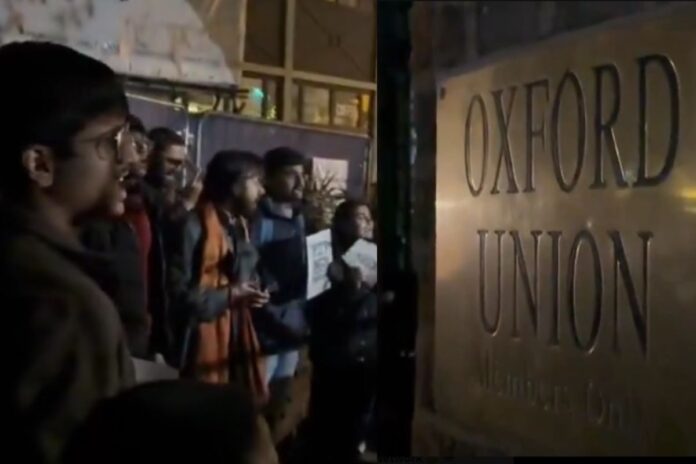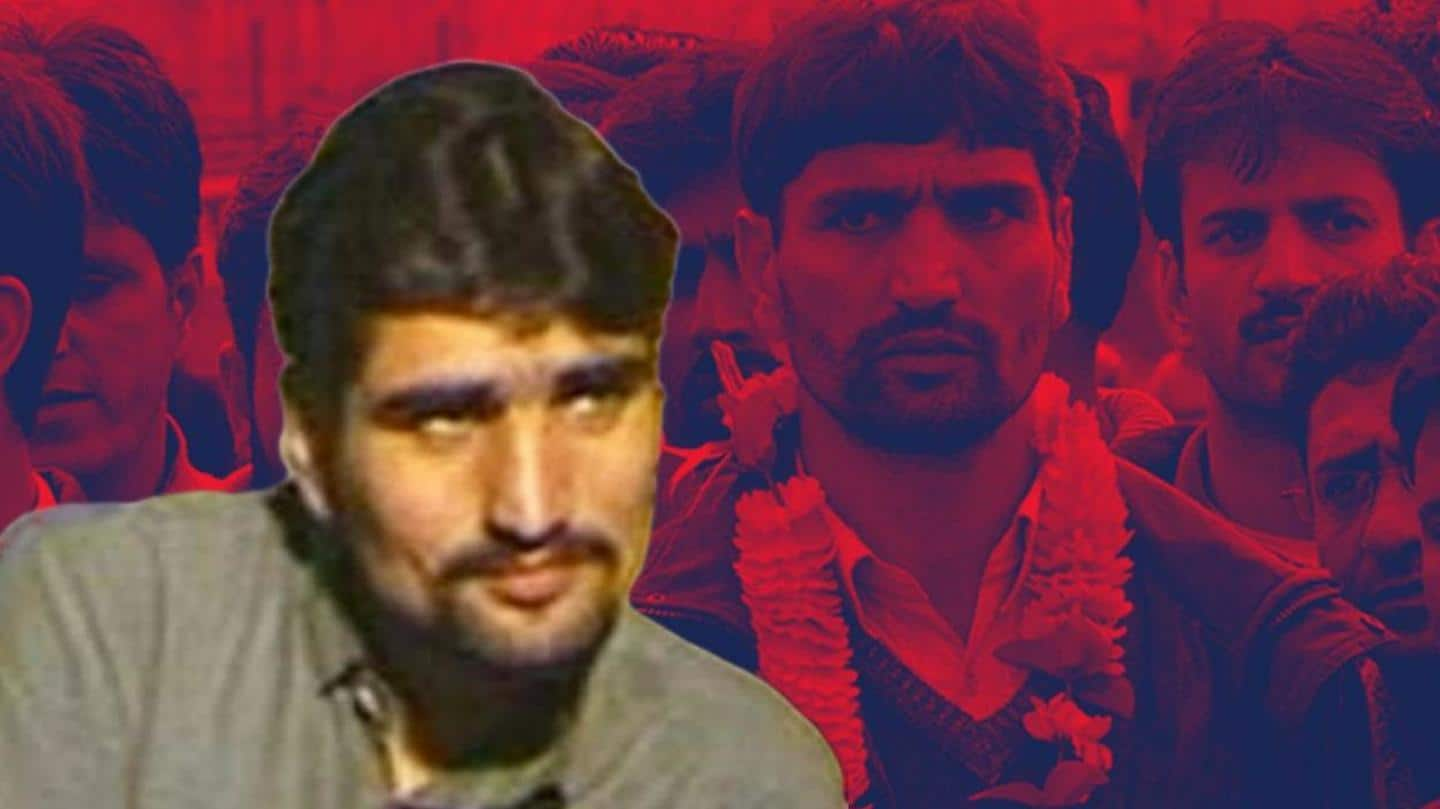
In a highly charged demonstration, Indian students in the United Kingdom gathered outside the historic Oxford Union Society building to protest a debate focusing on the status of Kashmir. The protest, organized primarily by Indian student groups and supported by Insight UK, a British-Hindu organization, took place as the Oxford Union hosted a debate titled, “This House Believes in the Independent State of Kashmir”. The students voiced their disapproval of the debate, specifically raising concerns about the backgrounds of some of the invited panellists.
The protesters argued that the Oxford Union’s choice of panellists included individuals who have allegedly engaged in hate speech and maintained links to organizations being investigated for ties to terrorism. Many in the Indian student community saw these selections as not only deeply insensitive but also potentially dangerous, given the context of the Kashmir conflict and its deep-seated history.
Concerns Over Panellists and Alleged Terror Links
The panellists invited to debate the proposition for an independent Kashmir included Dr. Muzzamil Ayyub Thakur, Raza Nazar, and Professor Zafar Khan. Insight UK and the protesting students raised particular concerns about these speakers, citing allegations of links to extremist activities. Dr. Thakur, president of the World Kashmir Freedom Movement, was a specific focal point of criticism. The group he heads was founded alongside Mercy Universal by his father and has been investigated by the FBI, Scotland Yard, and the Charity Commission for suspected ties to terrorist organizations, according to Insight UK’s statement.

Another panellist, Professor Zafar Khan, represents the Jammu and Kashmir Liberation Front (JKLF), an organization historically associated with violent actions in the region. Protesters pointed to JKLF’s involvement in the kidnapping and murder of Indian diplomat Ravindra Mhatre in the UK in 1984, as well as its role in the mass displacement of Kashmiri Hindus from their ancestral homes in the early 1990s. The protesters emphasized that inviting individuals linked to such groups legitimizes their actions and disregards the suffering endured by the Kashmiri Hindu community, who were terrorized and forced to flee their homes during the height of the conflict.

“We have sent a formal letter to Oxford Union expressing deep concerns over their decision to host a debate titled, ‘This House Believes in the Independent State of Kashmir’, on 14th November. The invitation of speakers with alleged links to terrorism is particularly alarming and raises serious questions about the integrity of this debate,” said Insight UK in a post on X, formerly known as Twitter. The group accused the Oxford Union of providing a platform to individuals who have incited violence and supported separatist movements with extremist undertones.
Oxford Union Defends the Debate
Despite the vocal protest, the Oxford Union defended its decision to host the debate, emphasizing the importance of discussing contentious issues. In a statement posted on its official Instagram handle, the Union said, “The Kashmir question, a parting gift of British colonial rule, has troubled the subcontinent since 1947, resulting in multiple wars. The continued push for Kashmiri independence has sustained a long-standing struggle, rooted in the region’s quest for self-determination and autonomy.”

The post went on to describe the ongoing crisis in Kashmir as one that involves human rights concerns, territorial disputes, and a persistent demand for autonomy by the people of the region. The Union posed the question, “Could an independent Kashmir be the answer to this enduring crisis?” This defense of the debate was seen by many as an attempt to frame the discussion within the broader context of historical grievances and the pursuit of self-determination, rather than endorsing any particular political viewpoint.
Protesters Highlight the Plight of Kashmiri Hindus
The Indian students protesting outside the Union building made it clear that their issue was not with discussing Kashmir per se, but with the perceived bias in the selection of panellists. They argued that including individuals with questionable backgrounds provided a skewed perspective, one that failed to represent the full complexity of the Kashmir issue, including the experiences of Kashmiri Hindus.
The protesters highlighted the plight of the Kashmiri Pandit community, which has faced targeted violence, leading to a mass exodus from the region in the early 1990s. According to them, the inclusion of speakers linked to organizations like JKLF, which they hold responsible for the terrorization of their community, was an affront to the victims and survivors of the conflict. “There can be no meaningful debate about Kashmir without acknowledging the suffering of all communities involved, particularly those who have been displaced and disenfranchised,” said one of the student protestors, who chose to remain anonymous.

Debate Participants and Polarizing Reactions
On the other side of the debate, arguing against the proposition of an independent Kashmir, were Siddhant Nagrath, Yusuf Kundgol, and Prem Shankar Jha. Jha, a seasoned journalist and former media advisor to ex-Prime Minister Vishwanath Pratap Singh, was praised by the protesters for providing a balanced and informed counter-narrative. His extensive experience at the United Nations and the World Bank brought a degree of credibility to the debate that the protesters felt was lacking among those arguing in favor of independence.

The protest garnered mixed reactions from the public. While some applauded the students for standing up against what they perceived as the glorification of separatist ideologies, others criticized them for attempting to stifle debate and academic freedom. “The Oxford Union has always prided itself on providing a platform for free speech, even if the views expressed are controversial,” said a spokesperson for the Union. “We believe that only through open dialogue can we begin to address the complex issues that have plagued regions like Kashmir.”
The Broader Implications
The Kashmir debate at Oxford has brought to the fore the deep-seated emotions and divergent perspectives that continue to surround the region’s future. For the Indian students and the wider diaspora, the inclusion of certain panellists was not just a matter of academic debate—it was seen as a legitimization of extremist ideologies that have caused untold suffering. For the Oxford Union, it was about maintaining its tradition of open discourse, even on the most divisive topics.
As the protest came to an end, the broader question remained: can there be a resolution to the Kashmir conflict that respects the voices of all stakeholders involved, without falling into the trap of endorsing extremism? For now, the debate, both inside and outside the Union’s walls, remains far from settled.
